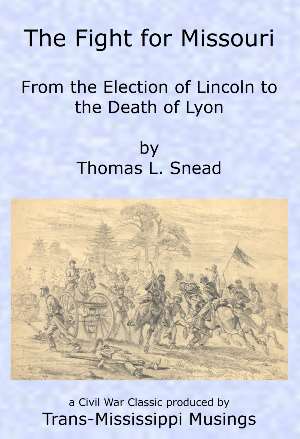Search:
Powered by
Website Baker
Civil War Classics from Trans-Mississippi Musings |
| Posted by The Muse (themuse) on Oct 18 2013 |
![]()
 I've started the Civil War Classics series from Trans-Mississippi Musings bringing the best of the works by authors who were present during the American Civil War in those states and territories west of the Mississippi River. These are public domain works, which I have reformatted as eBooks. The first classic in the series is “The Fight for Missouri” by Thomas L. Snead.
I've started the Civil War Classics series from Trans-Mississippi Musings bringing the best of the works by authors who were present during the American Civil War in those states and territories west of the Mississippi River. These are public domain works, which I have reformatted as eBooks. The first classic in the series is “The Fight for Missouri” by Thomas L. Snead.
It's currently available in Kindle format from Amazon.
Thomas Lowndes Snead was in a unique position to provide an eyewitness account of the events taking place in 1861, the year in which the American Civil War came to the State of Missouri. In 1860, Snead wrote about politics for the Evening Bulletin, a St. Louis newspaper. Shortly after Claiborne Fox Jackson was inaugurated as Governor of the State of Missouri, Snead left the Bulletin and became a full-time aide to the new Governor. As a result, Thomas Snead was present at all of the key events which took place in Missouri in at the start of the American Civil War.
Even though Snead was an ardent secessionist, this book provides one of the fairest and most balanced accounts of the struggle that took place to get control in the State of Missouri. Just read a couple of letters Snead received in 1886 from two of his adversaries during the war years.
Snead sent a copy of his manuscript to Franz Sigel and asked for his feedback. Sigel had been elected Colonel of the Third Missouri Regiment of Federal Volunteers mustered in 1861 in St. Louis. Sigel rose to the rank of Major-General of Federal Volunteers during the war. Sigel wrote back to Snead in an April 5, 1886 letter.
Please accept my thanks for the very interesting book … Considering that it is written by a former Confederate officer, who held important positions during the war and who was so intimately affiliated with one of the foremost political champions and military defenders of the South, Genl. Sterling Price, the book is written with remarkable fairness and impartiality. Besides this, it is the work of conscientious historical and statistical study, and has the advantage of your personal experience during the period to which it relates.
Likewise, Snead asked Charles D. Drake to read his book and provide feedback. Drake had been a Missouri legislator who became the leader of the Radical Union party in Missouri during that State’s reconstruction period after the war. Drake was elected to the United States Senate before resigning to accept a judicial appointment. Drake wrote to Snead in a March 24, 1886 letter.
[Your] book … impressed me as intended to be fair and truthful, and as being so in fact, so far as my memory of Missouri affairs in 1861 enabled me to judge.
What makes the work peculiarly interesting to me is that it gives an authentic inside view of the Secret movements and doings of the St. Louis Secessionists in the first four months of 1861. In that it is a really valuable contribution to history. Of course, the Unionists of St. Louis knew only so much of those things as the Secessionists allowed to become public, and therefore no Unionist could ever write a full history of those months. You have done a good work in writing it. If you have “displeased many of your old Confederate friends”, it must be because you have told more than they wished to have told, or because you have exhibited a fairer spirit than they cherish, or would have an ex-Confederate show.
I hope you enjoy reading this book.
Dick Titterington, aka theCivilWarMuse
Last changed: Oct 18 2013 at 12:55 PM
Back
Website design and hosting provided by Aphinity Communications.